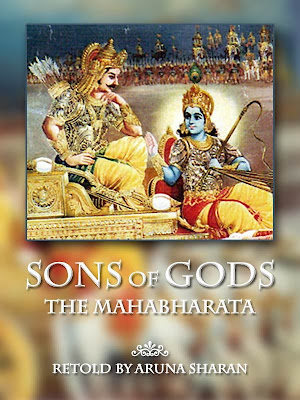Does the End justify the Means?
When the good guys play dirty...
Here, now, are the Rules of Engagement for the Kurukshetra War; they appear on page 257 of Sons of Gods:
And yet: in the course of the war just about every one of these rules are broken; in fact, all of them, except for number 6. And broken not only by the villains, but by the heroes. The "good guys" use every dirty trick in the book: because they must win to restore righteousness. They use underhand, unfair, despicable tactics -- and they are egged on and encouraged to do so by Krishna who is, of course, the Incarnation of God.
Does the end justify the means?That is one of the debatable questions posed by the Mahabharata.My statcounter tells me that most of the readers of this blog are Indians. You know the story. I'd love to hear from you -- tell me what you think!
Photo: from the movie The Mahabharata, directed
by Peter Brook
by Peter Brook
Here, now, are the Rules of Engagement for the Kurukshetra War; they appear on page 257 of Sons of Gods:
1. Fighting must not begin before sunrise, and not continue after sunset.
2. Multiple warriors may not attack a single warrior.
3. Two warriors may duel only if they carry the same weapons and they are on equal standing, that is, unmounted, or on the same mount: a horse, an elephant, or a chariot.
4. The rules specific to each weapon must be followed; for instance, in mace warfare it is prohibited to strike below the waist.
5. No warrior may injure or kill a warrior who has surrendered; one who has surrendered becomes a prisoner of war, subject to protection through his enemy.
6. The lives of women and farmers are sacred; they must never be attacked or hurt.
7. No warrior may kill or injure an unarmed warrior, or an unconscious warrior, or a person or animal not taking part in the war, or a warrior whose back is turned away.
8. No warrior may strike an animal unless directly threatened by that animal.
Seems pretty civil to me, considering this was, they say, 30 or so centuries ago!And yet: in the course of the war just about every one of these rules are broken; in fact, all of them, except for number 6. And broken not only by the villains, but by the heroes. The "good guys" use every dirty trick in the book: because they must win to restore righteousness. They use underhand, unfair, despicable tactics -- and they are egged on and encouraged to do so by Krishna who is, of course, the Incarnation of God.
Does the end justify the means?That is one of the debatable questions posed by the Mahabharata.My statcounter tells me that most of the readers of this blog are Indians. You know the story. I'd love to hear from you -- tell me what you think!




Comments